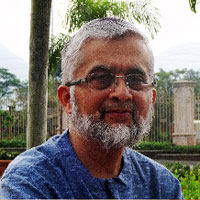Dr. Arif N. Merchant, Principal, PiCA
 Tekton marks a new beginning in Pillai College of Architecture. In the third decade of its existence graduates in architecture and now the first batch of post graduate students in urban design are making their mark. It is our philosophy to make a meaningful contribution to the society through architectural education. The college has been achieving this by being involved in indigenous community enhancement projects at different levels. Also, under the aegis of MES Research Forum, we have carried out research based design projects and presented individual research activities. It is now time to explore new horizons for dissemination of research methods and techniques in design discipline. A research journal is a very appropriate tool to reinforce skills in research based practice and education. This new endeavor will help culminate knowledge and ideas in academia and practice into a published form.
Tekton marks a new beginning in Pillai College of Architecture. In the third decade of its existence graduates in architecture and now the first batch of post graduate students in urban design are making their mark. It is our philosophy to make a meaningful contribution to the society through architectural education. The college has been achieving this by being involved in indigenous community enhancement projects at different levels. Also, under the aegis of MES Research Forum, we have carried out research based design projects and presented individual research activities. It is now time to explore new horizons for dissemination of research methods and techniques in design discipline. A research journal is a very appropriate tool to reinforce skills in research based practice and education. This new endeavor will help culminate knowledge and ideas in academia and practice into a published form.
In the second decade of the 21st Century, India is booming as an emerging economy. Under the pressures of development, the Architectural practice in India is struggling to find an identity between a practice which adopts the rich indigenous vernacular architecture and the one based on western modern influences. Our urban and rural landscapes are being dotted with alien and non-contextual Architectural characters, affecting our originality. We need to critically examine our academic discourse which still largely follows the same old philosophies of modern architecture, which are not embedded within the Indian culture. Because of this, our students and future Architects, struggle to understand the Indian identity.
We need to re-conceptualise Indian architecture for newer challenges and demands of the changing urban and rural contexts. We need to reinstate traditional construction methods within our curriculum, as that may lead to sustainable practice in India. We need to look for values within the vernacular, which can engage with the new evolving India. These values can only be found within our culture, by actively engaging with our own people and the materiality that surround them. This engagement can be perused through research based practices. We need to embed this knowledge generating process within our curriculum, so that it will find its reflection in all that we generate as design. Tekton is our take on emerging debates in architecture and urban design and planning. It goes without saying, that this effort will enrich our academic discourse through the rigor of research. Other than technical papers and dedicated essays, we will conduct focused interviews and put up critiques of work. With a strong team of peer readers who are established in research based practices, this journal will ensure quality and convergence of the wider design discipline. The first issue itself brings about this variety and tries to encompass this idea.
I want to thank and congratulate the editor of this journal, Prof.Smita Dalvi, for her relentless efforts in conceptualising and giving actual shape to this journal. I also want to thank the associate editor, Prof. Richa Sharma for her valuable contribution in the process of making of this journal. Prof. Jinu Kurien, Prof. Pallavi Dalal, Prof. Neha Sayed have provided immense support in bringing out this first issue. Our alumnus Ajay Pillai has meticulously designed the publication. I alsoacknowledge the support of the faculty members from our college in accomplishing this task. I thank our Board of Reviewers for their feedback and suggestions in bringing out this issue. Above all, I thank our contributors to this issue and we hope that this journal continues to receive patronage from its prospective readers and contributors. This initiative has been made possible due to unconditional support of the management of Mahatma Education Society – Dr. K. M. Vasudevan Pillai, Dr. Daphne Pillai, Dr. Priam Pillai and Mr. Franav Pillai. All credits to the entire team for achieving the goal of “thinking” materialize in “making”.
Dr. Arif N. Merchant
Principal, MES Pillai College of Architecture, Navi Mumbai
